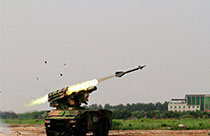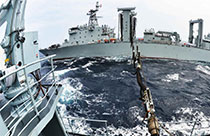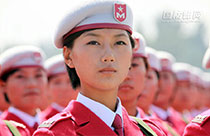

BERLIN, Aug. 29 -- China made a very important contribution to the victory in the World War II (WWII), which was little known to Europeans, former German chancellor Gerhard Schroeder has said.
Schroeder is among dozens of foreign statesmen invited to witness the military parade of China to celebrate the WWII victory. The event is due to take place on Sept. 3 at Beijing's Tian'anmen Square.
In a written interview with Xinhua, Schroeder said that when people in Europe talk about WWII, the main focus is usually on their own continent. It is little known to the public here that WWII also raged in Asia and the fascism also brought terrible suffering to the Asian people.
"Especially in China, people have suffered from the consequences of the Japanese aggression," said Schroeder. "The successful resistance put by the Chinese people at great sacrifice was a very important contribution to ending the Second World War."
"Therefore, I will come to China to express my sympathy to the victims and their descendants, and to pay my respects to the country," he added.
In 2004, Schroeder became the first German chancellor who took part in the D-Day festivities in Normandy, France, to commemorate the 60th anniversary of the Allied landing in Normandy.
Commenting on his participation in the D-Day festivities, he said he views it a special responsibility of Germany to remember the suffering and horrors of war, which was perpetrated by Nazi Germany.
Speaking of Germany's efforts to atone for its wartime crimes, the former chancellor noted that it had taken decades for the German people to be able to cope with its past.
And even today there are still groups of people in Germany that deny historical facts for ideological reasons and are not ready for reconciliation, he said.
"I think it is important for every country to shed light on its history and question it in an open and critical manner. And it is important to stand ready for reconciliation and forgiveness," he said.
Schroeder stressed the role of "courageous politicians" in promoting reconciliation in Europe, saying a united Europe has become a reality a few decades after the end of the war because those politicians were willing to take far-sighted decisions.
"In Japan, there were also important initiatives," he said, taking as example the 1995 landmark statement by former Japanese Prime Minister Tomiichi Murayama that made apologies to the neighboring countries of Japan for war and colonial rule.
The former Japanese prime minister is also due to attend the memorial ceremonies in Beijing next week.
"Peoples of Asia should continue treading this path of reconciliation," Schroeder said, expressing hope that the celebration events in Beijing offer an opportunity in this regard.
The former chancellor stressed it is important that people keep memories of the terrible consequences of the war alive and see it as a moral and political commitment to work for peace and security worldwide.
"This is all the more important since we currently see many conflicts in all regions of the world, which need collaborative efforts of the international community," he added.
Commenting on China's role in today's world, Schroeder said: "Over the past four decades, China has achieved an astonishing economic and political development, which is accompanied by increased international responsibility in Asia and beyond."
"Today we need the responsible participation of China for solving major global challenges."
 'Enemy planes' intercepted by Hongqi-7B air-defense missiles
'Enemy planes' intercepted by Hongqi-7B air-defense missiles Blind date with bikini girls in Nanjing
Blind date with bikini girls in Nanjing Amazing photos of Chinese fighter jets
Amazing photos of Chinese fighter jets Chinese soldiers participate in training for V-Day parade
Chinese soldiers participate in training for V-Day parade Painting: Lonely women in Forbidden City
Painting: Lonely women in Forbidden City China and Russia hold joint drill in Sea of Japan
China and Russia hold joint drill in Sea of Japan 'Goddess' in Taiwan McDonald's
'Goddess' in Taiwan McDonald's Female soldiers at military parades
Female soldiers at military parades Photos of campus belle doing splits go viral
Photos of campus belle doing splits go viral Going down again
Going down again Trump’s war of words needn’t be one way
Trump’s war of words needn’t be one way WWII photos blended seamlessly into modern-day Berlin
WWII photos blended seamlessly into modern-day Berlin Tianjin residents struggle to return to normality after disaster
Tianjin residents struggle to return to normality after disasterDay|Week